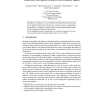Free Online Productivity Tools
i2Speak
i2Symbol
i2OCR
iTex2Img
iWeb2Print
iWeb2Shot
i2Type
iPdf2Split
iPdf2Merge
i2Bopomofo
i2Arabic
i2Style
i2Image
i2PDF
iLatex2Rtf
Sci2ools
106
click to vote
TCC
2010
Springer
2010
Springer
Public-Key Encryption Schemes with Auxiliary Inputs
We construct public-key cryptosystems that remain secure even when the adversary is given any computationally uninvertible function of the secret key as auxiliary input (even one that may reveal the secret key informationtheoretically). Our schemes are based on the decisional Diffie-Hellman (DDH) and the Learning with Errors (LWE) problems. As an independent technical contribution, we extend the Goldreich-Levin theorem to provide a hard-core (pseudorandom) value over large fields.
Cryptography | Independent Technical Contribution | Secret Key | Secret Key Informationtheoretically | TCC 2010 |
Related Content
| Added | 17 Mar 2010 |
| Updated | 17 Mar 2010 |
| Type | Conference |
| Year | 2010 |
| Where | TCC |
| Authors | Yevgeniy Dodis, Shafi Goldwasser, Yael Tauman Kalai, Chris Peikert, Vinod Vaikuntanathan |
Comments (0)

